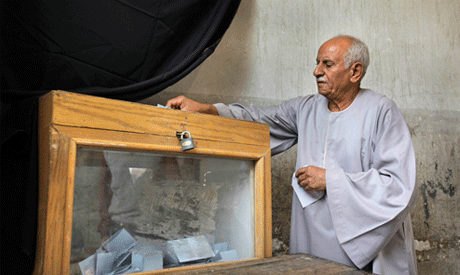By Adom M. Cooper
Impunity Watch Reporter, Middle East
CAIRO, Egypt–As the final stages of free and fair elections in Egypt came to a close, many faces and names reflect a substantive transition from the three decade rule of Hosni Mubarak. According to the Egyptian Election Commission, the Freedom and Justice Party (FJP), which represents Egypt’s Muslim Brotherhood, won 47 percent of all seats in the country’s election for the lower house of parliament.

The head of the Egyptian Election Commission, Abdel Moez Ibrahim, announced on Saturday 21 January 2012 that the FJP secured 235 seats in the new People’s Assembly. It also secured 127 seats on party lists, while its candidates won another 108 in the first-past-the-post constituency votes ever in Egypt. These votes were cast for individual candidates.
The Islamist Salafi al-Nour party won 24 percent of all seats available and the liberal al-Wafd won approximately seven percent of seats. The remaining 22 percent of seats were divided up amongst smaller political groups and parties.
The voter turnout for the polls was an impressive 54 percent.
Saad al-Katani, a leading Muslim Brotherhood official, shared these sentiments with a correspondent from Reuters concerning his intentions to have the assembly play a reconciliatory role.
“The priorities are meeting the demands of the revolution, including the rights of the injured and those killed in the uprising.”
The advent of the free and fair elections for the lower house of parliament is a landmark for the history of Egypt. They took place over three stages and two-thirds of the 498 seats up for election were reserved for those belonging to registered political parties, while the remaining one-third of seats were contested by individuals. Ten seats were reserved for appointees of the Supreme Council of the Armed Forces (SCAF), the military council that has been ruling Egypt since Mubarak’s ouster.
Al-Jazeera correspondent Sherine Tadros, reporting from Cairo, shared these sentiments about the outcome of the elections and what it means for the people of Egypt.
“This parliament, that has its opening session on Monday, has very limited powers. The most important thing it will be doing in the coming weeks and months, is setting up a 100-member body that will then write the constitution.”
There is much work to be done after the uprising in the country claimed many lives and left thousands of civilians feeling as if the military government would not substantively distance themselves from the practices of Mubarak’s regime. Elections for the upper house of parliament will take place in February, after which the constituent assembly will be selected.
But arguably the most important task will occur by June: the election of a new president. Hopeful candidates for the presidency can register to run by April 15.
Since the violence has effectively ended and new political leaders are ascending to important positions, the SCAF must deal with the thousands of people detained and imprisoned. The head of the SCAF, Field Marshal Hussein Tantawi, ordered the release of 1,959 people on Saturday 21 January 2012 being held in prisons after having faced military trials.
Al-Jazeera correspondent Sharine Tadros shared these words concerning the detainees.
“It is the biggest pardon since the ouster of then Presiden Hosni Mubarak. All of these people were incarcerated after the SCAF took over and they subjected about 12,000 people to military trials since then. Most of those who are incarcerated and are now being pardoned, are mainly in there for cases to do with rioting, attacking public buildings and so on. There has been a lot of talk about military trials. There’s a big movement here to try and get rid of these military trials, people saying that they violate human rights.”
One of the detainees, a blogger named Maikel Nabil, was convicted of insulting the military and sentenced to two years in jail was among those due to be released.
“Nabil was the first blogger to be incarcerated by military trial back in April and he was against the military and he spoke out against the military and wrote about the military and his case very much resonated across the country at that time because it fed into this idea that the country was just going back to its old ways. All of this coming just a few days before the first anniversary of the revolution, January 25. SCAF is very adamant to make this a day of celebration, whereas others are trying to make it a day of demonstration.”
With all of the deaths and violence that have befallen Egypt since the demonstrations and protests began, one can only hope that the presence of newly elected leaders will actually deliver the change that all of the civilians struggled for. The Arab Spring has fully sprung in Egypt and a new era of power transition has showed the world that peaceful demonstrations and protests can achieve the desired change. It is a great thing to see and hopefully, the Arab Spring can be viewed down the road as one of the Middle East’s pivotal movements for peaceful, democratic change.
For more information, please see:
Ahram – Islamists Win 70% Of Egypt People’s Assembly Party List Seats – 21 January 2012
Al-Jazeera – Muslim Brotherhood Tops Egyptian Poll Result – 22 January 2012
BBC – Egypt’s Islamist Parties Win Elections To Parliament – 21 January 2012
The Guardian – Egypt Elections Results Show Firm Win for Islamists – 21 January 2012
NYT – Islamist Win 70% of Seats In The Egyptian Parliament – 21 January 2012
Reuters – Islamist Secure Top Spot In New Egypt Parliament – 21 January 2012